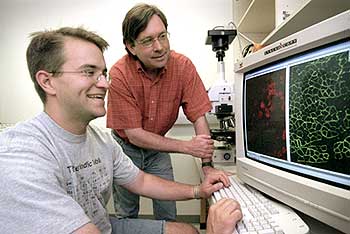 |
|||||||||
|
Research Feature Stories: Other News: |
Can Missing Genetic Information be Delivered to Cells?
Until recently, Chamberlain lived and worked in the Midwest. Recruited to the UW faculty last year, Chamberlain was attracted by the UW’s interdisciplinary environment.
|
Dr. Jeffrey Chamberlain (shown to the right with one of his colleagues) is involved in studies of diseases that cause muscle degeneration and weakness. |
 |
A UW School of Medicine Ph.D. alumnus, Chamberlain is an international leader in the search for gene therapies for muscular dystrophy. Both Chamberlain and Dr. Stanley Froehner, chair of the Department of Physiology and Biophysics, have strong research interests in the Duchenne’s form of muscular dystrophy.
Neurology department chair Bruce Ransom said, “Jeff Chamberlain is doing some of the most exciting research in the world on the problem of muscular dystrophy.”
Chamberlain has studied the location of the Duchenne muscular dystrophy gene and the genetic expression of dystrophin, a protein essential for normal muscle function. He is working on vectors that might deliver the missing genetic information into cells that are unable to produce dystrophin. Froehner has done research on the molecular mechanisms of muscle degeneration that appear in Duchenne muscular dystrophy.
Dr. Chamberlain’s research on muscular dystrophy draws support from individuals and organizations across the country, including a group of Michigan supporters who continue to send regular contributions. Locally, one of the founders of McCaw Communications, Bruce McCaw, and his wife Jolene McCaw earmarked a generous gift in support of Chamberlain’s work through the Muscular Dystrophy Association.
|
| UW AMC Medical Center | UW School of Medicine | Harborview | UW MC | Search UW AMC | UW Home | Contact Us | ©2001-2002, University of Washington Academic Medical Center. All rights reserved. Please honor our copyrights. |
|